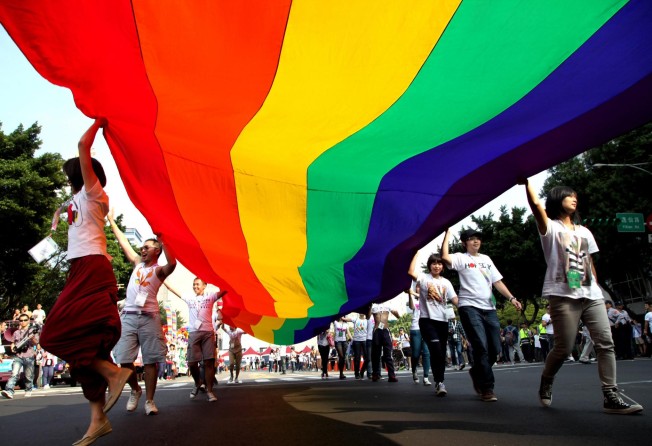Taiwan same-sex marriage bill prompts conservative backlash
Taiwan is known as a bastion of gay rights, but conservative, mostly Christian, organisations have drawn the line at same-sex nuptials

Although Taiwan has long been considered a bastion for gay rights in Asia, the passage of a same-sex marriage bill on the island looks far from certain, with key supporters voicing caution about the legislation's chances.
Late last month, the Legislative Yuan, Taiwan's parliament, decided for the first time to begin reviewing a bill aimed at legalising same-sex marriage.
However, the bill's early success prompted the mobilisation of powerful religious groups, who threaten to sink the proposal.
"This time we have gone a step further as I think society has grown much more tolerant," said legislator Hsiao Bi-khim, a key sponsor of the bill and a member of the main opposition Democratic Progressive Party. "However, the reality is it will be difficult. More discussion is needed to raise awareness."
According to Hsiao, Taiwan's partisan political culture and the influence of conservative groups on legislators could make passing the bill difficult.
"Usually, [our] bills don't get through the parliament," Hsiao said, referring to the DPP's lack of a parliamentary majority. "Some legislators are susceptible to pressure from well-organised conservative groups who reach across the political divide."
Hsiao said it would be impossible to estimate how long it could take the bill to go through the Yuan's required three readings.
Taiwan is generally seen as gay-friendly and years ago passed legislation banning discrimination on the basis of sexual orientation in schools and the workplace.
Taipei also annually hosts Asia's largest gay pride parade and recent polls suggest more than half of Taiwanese support same-sex marriage.
If the current bill is passed, Taiwan would become only the second place in the region - after New Zealand - to legalise gay marriage.
Victoria Hsu, president of the Taiwan Alliance to Promote Civil Partnership Rights, said she was optimistic that the bill could be passed, possibly within two years.
However, the emergence of a vocal opposition has surprised many and highlights the chasm between the island's traditional, rural inhabitants and its younger, more educated population.
A consortium of religious groups has taken shape, calling itself the Taiwan Family Alliance. Comprised mostly of conservative Christian churches, the alliance has collected nearly 400,000 signatures as part of a petition to block the gay marriage proposal.
On November 30, it hopes to rally 100,000 people in front of the government offices in Taipei.
According to Paul Chang, vice-president of the Unification Church Taiwan, the legalisation of gay marriage would "destroy the social foundation".
"We cannot accept a law that legalises adultery, incest and polygamous relationships," he said.
Chang has the backing of Liu Chao-hao, a prominent DPP lawmaker from the island's rural Taitung county.
Speaking at a rally last month, Liu said many legislators had privately expressed their opposition to the bill and he expected them to soon voice their opinions.
For pundits, the fate of the bill will depend on how legislators - particularly those with the ruling KMT party - are swayed by public opinion in the coming months.
No KMT legislator has so far endorsed the bill.
A spokesperson for KMT legislator Chiang Hui-chen said the lawmaker did not object to gay marriage and welcomed such opportunities to communicate with other parts of society.
"The bill will pass when the time is ripe," Chiang said last month, adding that her constituents were more concerned with the recent spate of food safety scandals.
Nonetheless, supporters of the bill remain sanguine, believing that the discussion itself will benefit Taiwanese society.
"We think it may be a long, long road before this bill is passed," said Yu Mei-nu, a DPP legislator and co-sponsor of the bill.
"The bill itself brings opportunities to discuss and rethink the issue and get more support from the public. It is great for the progress and development of Taiwan's civil society."